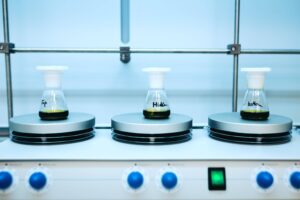How scientists in Lithuania are stepping up efforts to extract the cannabis plant’s lesser known beneficial ingredients.
 The cannabinoids THC and CBD are the most prominent compounds in the cannabis industry and are well-known for their health benefits.
The cannabinoids THC and CBD are the most prominent compounds in the cannabis industry and are well-known for their health benefits.
The range of cannabinoids expands far beyond these two substances, however.
Minor cannabinoids can also be utilised for specific purposes, incuding for their analgesic and anti-inflammatory properties.
Minor cannabinoids, such as cannabinol (CBN) and cannabichromene (CBC), can provide many health benefits and thus could be applicable in a variety of industries – such as pharmaceutical or wellness.
However, the miniscule concentrations of these compounds in the cannabis plant make the extraction process immensely difficult.
Enter Lithuanian-based cannabinoid research company Sanobiotec, which is developing proprietary technological processes for production of minor cannabinoids.
It has been working to improve the technological processes behind the production of CBN and CBC and the achieved results look promising.
“The purity of CBN and CBC isolates we have obtained is 99+ per cent” says Rytis V. Urbonas, director of technology development at Sanobiotec.
“These are highly positive results, given the peculiarities of each process. Our aim was to produce compounds that could be easily incorporated in custom formulations, which is exactly what we managed to achieve.”
According to Urbonas, the interest in THC and CBD’s structural “siblings” and their potential in cannabinoid-based drug development was a natural outcome of the company’s research and development activities.
“We are well into the second year of our project, implemented in partnership with the National Cancer Institute in Lithuania. Currently, we are examining the potential of natural and novel synthetic cannabinoids for targeted cancer treatment based on their molecular mechanisms.
“Further research will enable us to delve deeper into understanding the effects and properties of these compounds.”
Sanobiotec aims to research and implement new techniques to produce minor cannabinoids, such as cannabidivarin (CBDV), tetrahydrocannabivarin (THCV) and other compounds, such as cannflavin A, with more efficiency.
This will enable the company to produce cannabis compounds that had only been identified or were tricky to isolate due to their scarcity in the hemp biomass.
According to Urbonas, there are already more than 100 cannabinoids identified, thus the potential for new phytochemicals is limitless.
“Once the most promising compounds are identified, we move rapidly. Our goal is to become a hub for cannabinoid research, development and production, so our team is determined to maintain the fast–paced development,” he says.
The upcoming research is a joint project with the Life Sciences Centre of Vilnius University and will explore the promising potential of cannabinoids in the treatment of Alzheimer’s disease and other neurodegenerative disorders.

